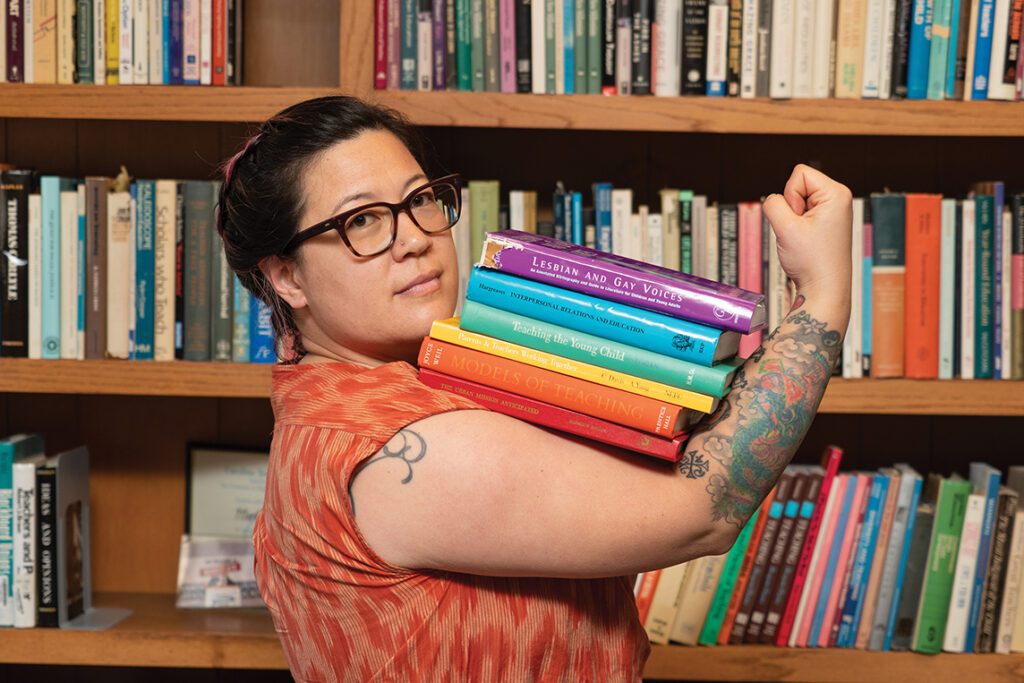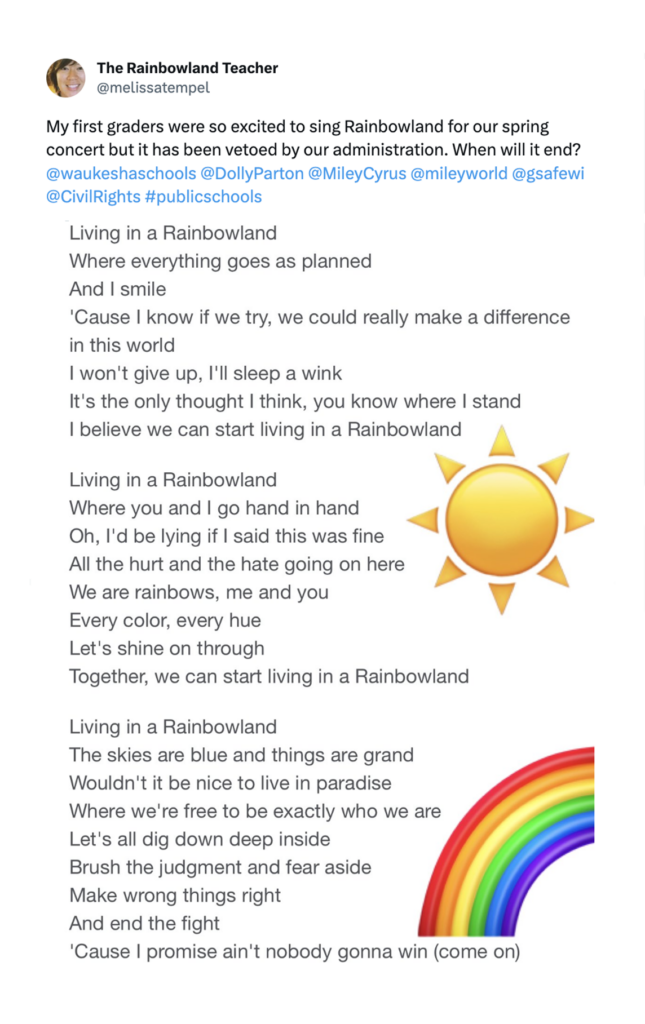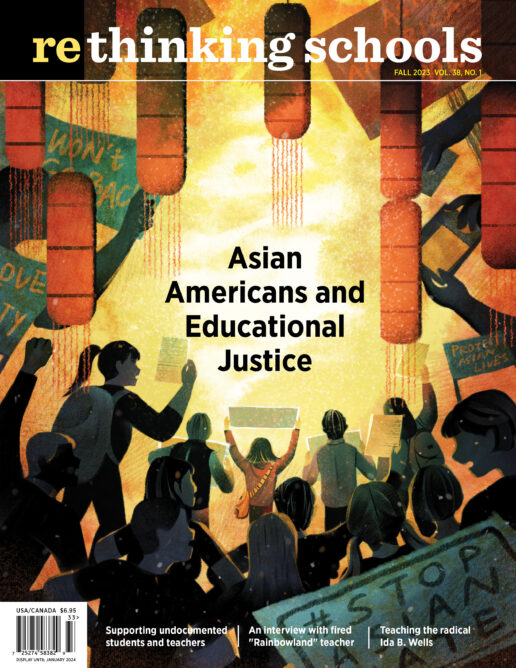Fighting for LGBTQ+ Youth and Families
An Interview with Melissa Bollow Tempel

On July 12, 2023, 1st-grade teacher Melissa Bollow Tempel was fired in a unanimous vote by the Waukesha, Wisconsin, school board. Her offense: a tweet in which she criticized the district’s decision to bar her students from singing the Dolly Parton and Miley Cyrus song “Rainbowland” in a school concert. Censorship of “Rainbowland” followed two years of escalating repression, from disbanding the district’s equity team to ripping rainbow flags and anti-racist signs off classroom walls, banning rainbow lanyards, and pulling LGBTQ+ books off library shelves. The district even removed displays of its own Nondiscrimination and Access to Equal Educational Opportunity Policy as well as signs that read “This school welcomes you.”
On Sept. 5, 2023 — which would have been Tempel’s first day of school with her students in Waukesha — Tempel filed suit in Federal District Court against the school district and Superintendent James Sebert. Tempel is represented by Summer H. Murshid, of Hawks Quindel, S.C. The complaint alleges that the district and Superintendent Sebert “violated Ms. Tempel’s First Amendment free speech rights by retaliating against her for engaging in protected speech.” (See the press release and full complaint here)
Tempel, an award-winning dual-immersion teacher with 23 years of experience and National Board Certification, is a long-time education activist and advocate for LGBTQ+ youth. A former Rethinking Schools editorial board member, she co-edited Rethinking Sexism, Gender, and Sexuality (2016) and Pencils Down: High-Stakes Testing and Accountability in Public Schools (2012). Jody Sokolower, former Rethinking Schools managing editor, spoke with her after her termination hearing.
Jody Sokolower: Before we get into the events that led to you being fired, what do you do in 1st grade to make school feel safe for kids who might be queer or trans, or who have relatives and friends who are queer or trans?
Melissa Bollow Tempel: It’s hard to describe because my practice is so embedded in how I am as a teacher now that I don’t often have to think consciously about it. [For more on Tempel’s journey to become a supportive teacher for LGBTQ+ youth, see her article “It’s OK to Be Neither: Teaching that Supports Gender-Variant Children.”] For example, I never address the class as “boys and girls.” We read books that provide mirrors and windows, so children see themselves reflected and also are exposed to a wider reality. I look for books that don’t necessarily focus on the difficulties of being queer or trans, but that include characters who could be queer or trans — and books where a character has two dads, but the book isn’t about having two dads. I make sure that my students know that I don’t see those things as weird or something to be surprised about. I guess the word is normalizing, but I don’t like that term. I’ll show them a picture of friends of mine, two women with two kids. And I don’t mention anything specifically unless they ask.
Here’s a different example of the same principle: I used to ask “How do you celebrate Christmas?” Then I moved to “What holidays do you celebrate?” and finally to “What do you do over winter break?” — making those slight adjustments to my thinking to make sure that I’m including everyone.
Every year I ask the parents to send in a picture of their family. I print them and frame them, and they’re up on the wall in the classroom. Everybody’s family is there, and the children can see everyone’s family, and you can say “hi” to your parent when you walk by if you want to.
JS: The problems started in 2021, right? What happened?
MBT: When COVID hit in early 2020, most schools closed, but not Waukesha. We were wearing masks, though, and there was a small group of people who didn’t want their kids to have to wear a mask. So they got their people elected onto the school board. At a school board meeting in May of 2021, they voted to end the mask policy, and most of them ripped their masks off and made a big show out of it.
The next August, right before school started, the superintendent sent a directive to remove any signs that could be “controversial.” Examples included “Black Lives Matter,” “Blue Lives Matter,” “This is an anti-racist classroom.” That jolted me. Most people weren’t talking about the importance of anti-racist signs to make the classroom feel welcoming, but I thought “No, this is terrifying.” Probably that’s because I realized deep down that it affected me personally as a woman of color, but at the time I wasn’t thinking about it like that.
Then, following that directive, other people from the district were taking down pride flags, rainbow signs, “safe space” stickers, anything that could be seen as supportive of LGBTQ+ youth. In 2017, the school board had passed a Controversial Issues in the Classroom Policy, and it’s so vague that just about anything can be seen as controversial. A kindergarten special ed teacher at another school in the district was suspended for refusing to take down a pride flag in her classroom.
This year, the school board changed the dress code, and now you can’t wear a mask that has more than one color or a rainbow lanyard. And they created a parental rights resolution with basically the same guidelines as Florida’s and Moms for Liberty: If a student comes out to you as queer or trans, you have to tell their parents. You have to call a child by the name and pronoun on their official paperwork unless you have written permission from the parents. They inventoried all the books in the classrooms and libraries, and pulled books with LGBTQ+ themes.
JS: How did everyone react to all the changes?
MBT: When we were told we couldn’t wear rainbow lanyards, some high school teachers decided to wear glittery pink lanyards instead. They approached Diverse & Resilient, an LGBTQ+ advocacy organization in Milwaukee, which bought 100 lanyards for any teachers who wanted to wear them. First and foremost, we wanted the kids to know that we still supported them. We wanted to make sure that vulnerable students knew that we still had their backs.
Some of the strongest organizing against the district’s new policies came from a group of parents in the district, the Alliance for Education in Waukesha, who originally came together because they were upset that the district wasn’t taking COVID seriously enough. For example, if everyone in your family had COVID, but you didn’t have any symptoms, you could come right to school. Without a mask. And the school board voted to decline federal funding for free lunch during COVID. So there were a lot of issues. They started out as Parents for Science, and then they became Parents for Science and Rainbows; that was their nickname for themselves. They talk to teachers to find out what teachers are worried about for themselves and for their students, because whatever’s worrying the teachers is going to be even more worrisome for the students.
The older students fought back, too. Students from the GSAs (Gay Straight Alliances) made public comments about how important the gay pride signs, safe space stickers, and flags were — how good it felt to see those when they were having darker days, and when they were feeling confused or didn’t know who to talk to.
But all that fell on deaf ears [at the district]. At the school board meetings, it was as if no one had spoken to them. When a teenager was crying about how they were so depressed they had to be hospitalized, the board members didn’t even answer. It was horrible.
It’s not directly related, but I need to mention something else: In November 2021, someone drove an SUV through the annual Christmas parade in Waukesha, killing six people and injuring 62 others. Many of our students were at the parade, some within inches of being hit. So the whole district was in post-trauma mode. Many of the children were having nightmares or having trouble concentrating. In the classrooms, we were working so hard to support those kids; I became even closer to the children and their families than usual, and I knew how much the children needed me to be there for them.
JS: There was already so much going on before the song. What happened last spring?
MBT: In early 2023, the music teacher was planning our spring concert. We sing songs in my classroom all the time. It’s 1st grade and we’re doing two languages, so we sing songs. The music teacher, who knows how much we sing, sent us a link to “Rainbowland” by Miley Cyrus and Dolly Parton as one of the songs selected for the spring concert.
But then in March we got an email from the music teacher saying that “Rainbowland” was out. The District would not allow it to be performed.
I was shocked. I decided I would tweet about it.

JS: What did you tweet?
MBT: “My 1st graders were so excited to sing ‘Rainbowland’ for our spring concert but it has been vetoed by our administration. When will it end?” And then the text of the song.
It got picked up and it went everywhere. This was during spring break. I tweeted on Tuesday. Friday night I saw something about it in the LA Times. Then I saw it was on TMZ. I thought, “Maybe I should look at my Twitter account.” There were a bunch of messages from different media asking for interviews. I was excited that people thought it was as ridiculous as I did, and wanted to know more about why this was happening. I did the interviews, explaining how we couldn’t have safe space stickers, or rainbows, or anti-racist signs, and all that.
When I showed up for school on Monday after the break I was met by the police, the deputy superintendent, a school board member, my principal, and someone from human resources. They told me that I was being put on administrative leave, and that I needed to give them my district-issued computer and iPad and leave. That was it. I wasn’t allowed to say goodbye to the kids, and I was told not to talk to anybody about this or it would be grounds for immediate termination. On the way out I got a text from a mom, saying that her son had started a new medication over spring break. I thought, “What am I supposed to do with this? I’m not allowed to talk to anyone.”
Then I was on leave, and I didn’t know what was going on. The hardest part was that my students didn’t have a teacher and the families weren’t even given the respect of a message from the administration saying “We’re sorry your teacher’s out, this is who to contact if you have questions.” Nothing.
I heard from parents that their kids were really affected by my absence. Because of the attack on the parade, a lot of the kids were especially sensitive to change and had a lot of social-emotional needs.
JS: How did the community respond?
MBT: The Parents Alliance did a press release. They sent emails. They sent more emails. They organized other people to send emails to the superintendent and the school board. At one point I heard that the district was getting 35 emails in support of me to every one email against. I don’t know how many they got in all, but according to the testimony at the hearing, they had hundreds of emails and voicemails.
The week after I was put on leave, the United Unitarian Universalist Congregation organized a “Rainbowland” sing-along at the school board meeting.
Wisconsin State Superintendent of Schools Jill Underly wrote a letter to the school board saying: “You are, under the guise of protection, causing undue harm to students and staff. . . . It is paramount that you change course now.” She really stuck her neck out to do that.
JS: What about the union?
MBT: The union and the parents organized a Rainbow Day in the district when students and staff wore rainbows in support of me. Without the union [Wisconsin Education Association Council and the National Education Association], I would have been fired without a public hearing. I wouldn’t have been able to hire a lawyer to work with me. And I wouldn’t have been paid while I was on administrative leave. So I’m definitely grateful that I am a union member, and that the unions exist. But this is a good example of why unions need to step up, because I think that a lot more could have been done.
JS: I know you got incredible support from all over the country. Can you share a couple of examples?
MBT: GSAFE, which works to ensure that trans students are supported and respected in Wisconsin schools, had a conference in April where they sang “Rainbowland” for me, videotaped it, and put it online.
Then the Stonewall Chorale, New York City’s first LGBTQ+ choir, sang “Rainbowland” in my honor at their Pride Month concert. They invited me to the concert, and it was amazing. The theme was drag queen storytime. The drag queen star Temple Grandé — who is the most grande person you’ve ever met in your life, like 6 feet 5 inches — wore a beautiful rainbow gown and read a story about LGBTQ+ history, interspersed with songs from each era, and then the chorale ended with “Rainbowland.”
When Temple Grandé said, “And that teacher is here!” everyone in the audience gasped, and then they gave me a standing ovation.
All the support makes me want to keep going. I’ve been given this opportunity and it’s my duty to do whatever I can with it. I can’t just let it pass by without trying to raise more awareness. It’s a perfect storm: I’ve had years of experience organizing around education and LGBTQ+ rights at school. And then there’s this song by two famous artists, and it was a song that nobody knew because it didn’t hit the top 100 when it was released in 2017. When people see who wrote the song, they want to listen to it, and they’re baffled about why there’s a problem, and so that works out in our favor. In many ways, this opportunity is a gift, and I’m excited for whatever can happen for however long it lasts.
JS: What happened with your job?
MBT: The superintendent sent me a letter recommending that I be fired. He ignored why “Rainbowland” was barred and said the way I raised my disagreement was “inappropriate, disruptive, and in violation of various district policies.” There was a public hearing on July 12. A couple of hundred supporters came, wearing black and carrying signs about First Amendment rights. They filled the hearing room and an overflow room.
But it wasn’t a real hearing. The person running it was the school board’s lawyer. And the district hadn’t honored any of our public record requests, so we had no way to argue about what happened. So my lawyer asked as many questions as possible with an eye toward the next step. And the school board voted unanimously to fire me.
JS: What are the next steps?
MBT: We’ve filed a lawsuit with the Federal District Court in Wisconsin and in the meantime, I’m committed to doing as much outreach as I can. I’m connecting with other teachers and educators who have been through similar experiences.
JS: How do you see the relationship between the attacks on trans and queer youth in schools (which is really why you got fired) and attacks on teaching Black history, critical race theory, the book bans?
MBT: It’s all coming from the same place. Right-wing politicians want what we can teach in our public schools tightly controlled and censored. They want to eliminate teacher autonomy so we can’t do what we need to do: Teach students the people’s history, give them multiple perspectives on the world, and be inclusive, accepting, and supportive of all students. These are public schools and yet we are being told to ignore the needs of our students. It’s mind-blowing.

